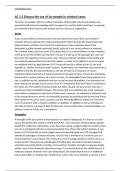Summary
Summary WJEC criminology unit 3 - crime scene to courtroom AC 2.5
- Course
- Institution
- Book
This document includes notes and information about AC2.5 within unit 3 criminology that allowed me to achieve an A grade. Here you will find information about the use of lay people in criminal investigations, alongside the strengths and weaknesses they provide.
[Show more]




